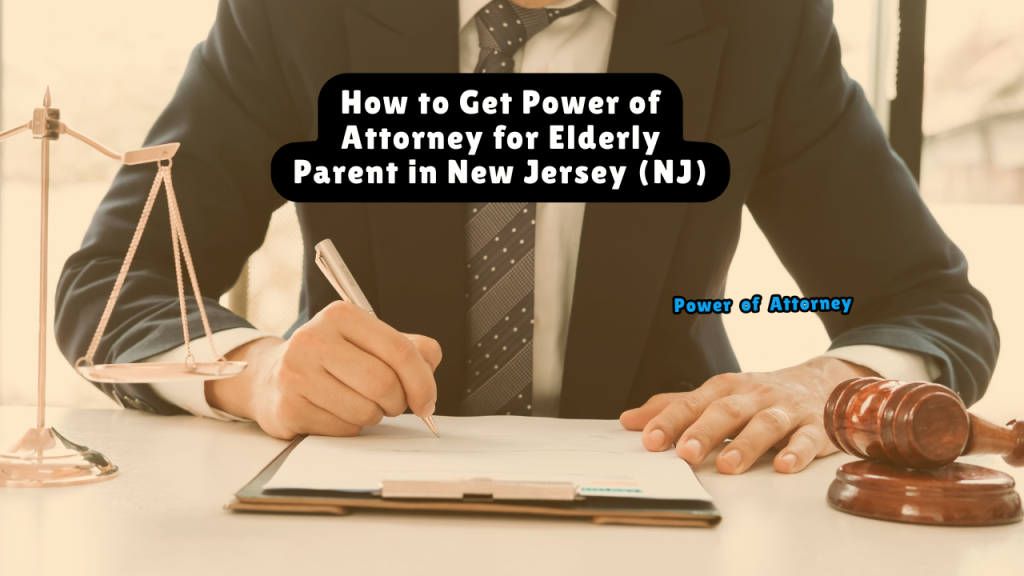How to Get Power of Attorney for Elderly Parent in New Jersey (NJ)
Planning for the future is critical when it comes to aging parents. A Power of Attorney (POA) allows a trusted individual—the agent or attorney-in-fact—to legally manage financial, healthcare, or legal matters on behalf of the principal (your parent).
In New Jersey, the process must comply with specific legal requirements. This guide explains, step-by-step, how to get POA for your elderly parent—including key legal tips, common mistakes to avoid, and expert advice.
Table of Contents
Step-by-Step: Getting POA for Your Elderly Parent in NJ
1. Confirm Their Mental Capacity
Your parent must be mentally competent to understand and authorize the POA.
If you notice signs of dementia or cognitive decline, get a doctor’s assessment before moving forward.
Tip: Mental capacity is essential—without it, a court-appointed guardianship will be required instead.
2. Discuss the Intent
Talk openly about the reasons for creating a POA:
- Explain the purpose (financial, medical, legal decisions).
- Confirm they trust you as their agent.
- Ensure the decision is voluntary without pressure.
Family transparency now can prevent major disputes later.
3. Choose the Right Type of POA
| Type | Purpose |
| Durable POA | Stays valid if the parent becomes incapacitated. Best for elder care. |
| Medical (Healthcare) POA | Covers decisions about medical treatments. |
| Financial POA | Manages banking, taxes, property, and bills. |
| Limited POA | Grants authority for specific tasks or limited periods. |
Tip: Most families prepare both a Durable Financial POA and a Medical POA for full coverage.
Use official New Jersey templates like those available from the New Jersey State Bar Association or consult an attorney for a custom document.
4. Download or Prepare the NJ POA Form
You can:
- Download an official New Jersey POA form.
- Hire a lawyer for a customized document.
The document must include:
- Full names and addresses of principal and agent
- Specific powers granted
- Durability statement (if applicable)
- Revocation clause (if replacing an older POA)
- Effective date
Tip: Using a lawyer ensures compliance with the New Jersey Revised Statutes Title 46:2B.
5. Sign and Notarize the Document
New Jersey law requires:
- Principal must sign willingly.
- Document must be notarized.
- Two adult witnesses must also sign (who aren’t named as agents).
A notarized signature is crucial. Without it, the POA may be invalid.
Related article:
How to Remove Power of Attorney from Someone?

6. Distribute the Signed POA
Give copies to:
- Banks and financial institutions
- Doctors and healthcare providers
- Your parent’s lawyer (if any)
- Trusted family members
Store the original safely, and always keep backup copies accessible.
7. Record the POA (If Needed)
If the POA involves real estate transactions, it should be recorded with the County Clerk’s office in the county where the property is located.
Recording protects the agent’s right to act in property matters.
Special Situation: If Your Parent Is Already Incapacitated
You cannot create a Power of Attorney if your parent has already lost mental capacity.
Instead, you must:
- File for guardianship through the Surrogate’s Court in New Jersey.
- Provide medical evaluations proving incapacity.
- Attend a formal hearing (lawyer involvement likely required).
Guardianship is costly and time-consuming—it’s best to complete POA while your parent is still capable.
Responsibilities of the Agent
Once appointed, you have serious legal and ethical duties, including:
- Acting in your parent’s best interests
- Managing finances responsibly
- Making healthcare decisions (if authorized)
- Keeping accurate records
- Avoiding conflicts of interest
Abusing a POA can lead to civil lawsuits or criminal elder abuse charges.
Common Mistakes to Avoid
Using generic online templates without NJ-specific customization
Failing to notarize and witness the document properly
Not involving your parent in the decision
Waiting too long (losing capacity kills the option)
Early preparation saves thousands in legal fees and months of court delays later.
Legal References
- New Jersey Revised Statutes Title 46:2B
- NJ Department of Health – Advance Directives
- Surrogate’s Court Rules for Guardianship
Expert Insight
“The best time to prepare a Power of Attorney is before it’s needed. Acting early can save families stress, legal fees, and delays.”
— Marla Greene, Elder Law Attorney, NJ
FAQs
How do I legally obtain a POA for my parent in NJ?
Create a written POA, notarize it with two witnesses, and distribute copies to necessary institutions.
Do I need a lawyer to prepare the POA?
No, but using a lawyer ensures it meets all legal standards and avoids costly mistakes.
Can I set up a POA if my parent is incapacitated?
No. You must go through guardianship proceedings.
Is notarization required in New Jersey?
Yes. Notarization and witnesses are mandatory for enforceability.
Can multiple agents be appointed?
Yes, and you should also name a successor agent if possible.
What happens after POA is signed?
The agent can act on the parent’s behalf immediately or under conditions stated in the document.
How do I revoke or terminate a POA?
Sign a notarized revocation document and notify all involved parties.
Final Takeaways
Confirm mental capacity early.
Choose the correct POA type.
Follow strict NJ notarization and witness rules.
Distribute copies strategically.
Act now—delay could mean costly court intervention later.
About the Author

Sarah Klein, JD, is an experienced estate planning attorney who has helped clients with wills, trusts, powers of attorney, and probate matters. At All About Lawyer, she simplifies complex estate laws so families can protect their assets, plan ahead, and avoid legal headaches during life’s most sensitive moments.
Read more about Sarah
